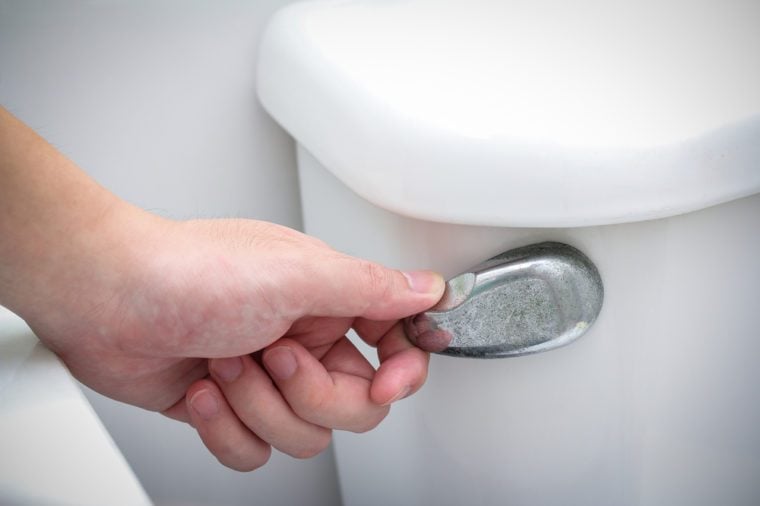
Leaving the toilet lid up when flushing
That lid is there for a reason! According to the American Journal of Infection Control, when you flush, the contents of the toilet (water and otherwise) get tossed around, sending a spray flying into the air that contains microscopic bacteria. If you don’t close the toilet lid, the bacteria can contaminate your hands, bathroom surfaces, and even objects like toothbrushes.
Find out 20 more bathroom mistakes you didn’t know you were making.

Chewing on pens
Do you know where that pen has been?! Even if you do, your mouth should probably not be one of those places. If the pen belongs to you, that still means your maybe-not-so-clean hands have touched it, and since chewing on a pen is usually a nervous habit that you do automatically, chances are you haven’t taken into account the cleanliness of the pen, or of your hands. Plus, gnawing on pens isn’t great for your teeth, either.
Find out which tricks to avoiding germs don’t actually work.
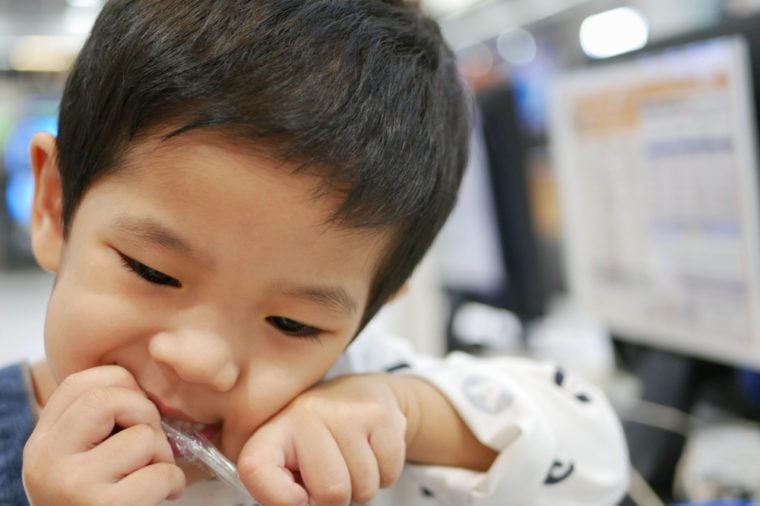
Opening things with your teeth
Yes, sometimes when you can’t get a package open, it may seem more convenient (and, occasionally, more effective!) to get it started using your chompers. However, not only can this be potentially damaging to your teeth, but it can also spread germs. In addition to the germs from your own mouth being transferred to the package, you’re also making contact with any germs that were already present on the packaging.
Here are 13 secrets your dentist wants you to know.

Blowing out birthday candles
Unless your birthday wish is to have germs all over your cake, you might want to reconsider this common tradition. When you blow out candles, you release bacteria that’s been inside your mouth. And guess where it goes? Toward the target of that air: the surface of the cake. While there’s a slim chance of actually getting sick from these germs, it’s still a little icky—especially since a study showed that blowing out candles causes the amount of bacteria on the surface of a cake to increase by 1,400 per cent.
Find out how often you should be replacing your toothbrush (and what can happen if you don’t).
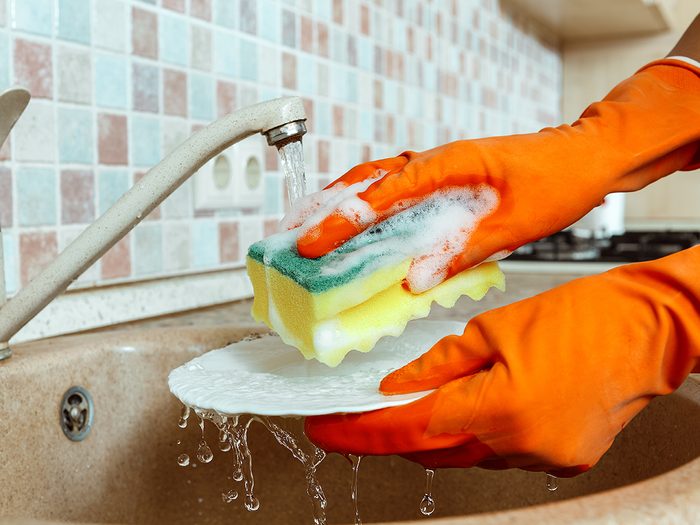
Making your kitchen sponge do double duty
News flash: Your kitchen sponge, a tool you use all the time to keep things clean, is not clean. Unless you wash and/or replace your kitchen sponge weekly, it’s probably home to some unwelcome bacteria. Bacteria that causes foodborne illnesses, like Salmonella and E. coli, are the primary culprits. Worse still, if you clean your sink with the same sponge as you use to wash your dishes, you’re transferring all the icky germs from the interior of your sink to your dishes and food. To stop the spread of germs, have two separate sponges, one for each cleaning task.

Eating at the beach
You know that you’re supposed to always wash your hands with soap and water before eating. But, far too often, people let their common hygiene habits go out the window when they’re snacking by the shore. Washing the sand off your hands in the ocean water is totally fine, right? Well…maybe not. According to the World Health Organization, beach sand contains lots of microorganisms, some of which can spread pathogens. You certainly don’t have to swear off beach picnicking forever, but make sure you’re remaining conscious about cleanliness. Try to wash your hands with soap and clean water before you enjoy your beach meal or, at the very least, pack some hand sanitizer and scrub your hands thoroughly with it.
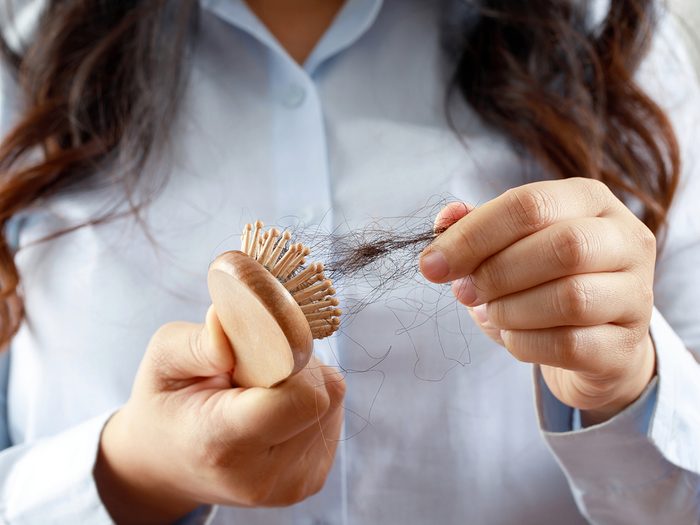
Letting hair accumulate in your hairbrush
If the thought of a hairbrush with a layer of loose hair sitting amid the bristles gives you the heebie-jeebies, you’ve got the right idea. When that hair builds up in your brush, so too do oils from your skin, dead skin cells, and sticky deposits of hair product. When you use that same brush, those things—and the germs they carry—get transferred right back to your coif. You’re best off pulling all of the loose hair out every time you’re finished using the brush and tossing it straight into the garbage. You should also soak the brush in warm, soapy water at least once a month.
Discover the sneaky reasons your hair is falling out.
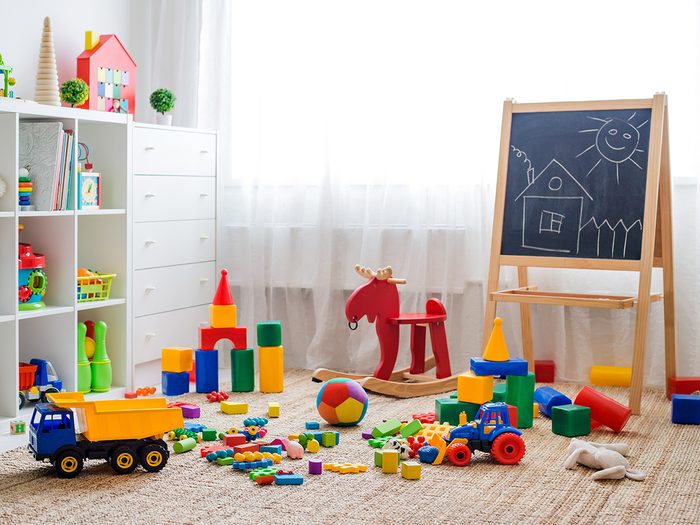
Not disinfecting children’s toys
As any parent knows, young children have some gross behaviours. They put toys in their mouths, bang them on the ground, and, yes, pick their noses. To make matters worse, their underdeveloped immune systems make them particularly susceptible to illness. So parents, and, really, anyone who looks after little ones, should make sure that they’re cleaning and disinfecting toys regularly (every few weeks or so, depending on how often the child plays with the toy). Especially if you have more than one child, or if your child has friends over, make sure you’re wiping down toys with disinfectant wipes, or putting them in the dishwasher or washing machine. Most toys’ packaging and/or tags contain specific cleaning instructions.
These cleaning hacks help take the hassle out of housekeeping.
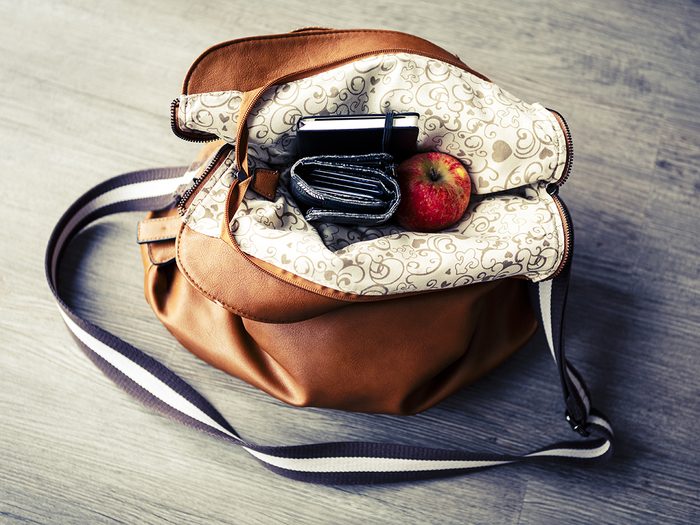
Putting your purse on the floor
You might know that the inside of your handbag can get icky if you don’t clean it out, but don’t forget about the outside of your purse too! Especially if you’re in the habit of plopping it on the ground to get it off your hands (even just for a short time), the bag’s exterior is probably home to lots of germs. And don’t forget to clean the handle of your purse, too, since it can collect bacteria from constant exposure to your hands.
Here are 11 everyday items you don’t wash nearly enough.

Eating at your desk
Now you have an excuse to get up, walk around, and actually take a break during your lunch break. Not to gross you out, but your computer keyboard is most likely home to some serious germs, unless you clean it regularly. If you eat your food on the same surface as your keyboard, you run the risk of ingesting those germs, which are definitely not on the menu!
Believe it or not, these 15 surfaces could be dirtier than a toilet seat!